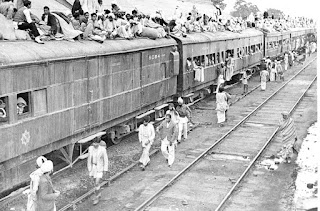CONTESTING PERSPECTIVES ON JINNAH AFTER HIS DEATH?
Mukesh Devrari
One can find in Jinnah what one is looking for. If you are looking for the liberal westernized secular politician, you can definitely find one before Jinnah devoted himself to the communal cause of Muslim league or after the creation of Pakistan in his last speech where he sounded more like Congress leader. Cigar, whiskey, pork and aloofness to religion were standard markers of his life. Mr Jinnah was born in Karachi on December 25, 1876. He was the eldest son of Jinnah Poonja, a well to do Hindu merchant. The son later adopted his father's first name as his own last name.
After attending a school in Karachi, he went to England at the age of 16 to study law at Lincoln's Inn. He returned to India four years later in 1896 as a full-fledged barrister. He had learned to speak English perfectly – at one time he even toured England as a Shakespearean actor – and for the rest of his life he was more at home in English than in Gujarati, his mother tongue or Urdu, the language of most Indian Moslems. A man of bewildering paradoxes, the Quaid-e-Azam or "Great Leader", as millions of Indian Moslems called their hero - was actually a born Hindu and espoused Islam during his youth(Reuters, 1948).
Bengali Congress leader Sarat Chandra Bose’s obituary comment, paying “a tribute to the memory of one who was great as a lawyer, once great as a Congressman, great as a leader of Muslims, great as a world politician and diplomat and, greatest of all, as a man of action.”(Jalal, 2017)
New York Times provided flashed the news about the death of Mohammad Ali Jinnah on the front page of the Newspaper. News about his death was followed by a long discussion on his life. He was described as a virtual creator of Dominion of Pakistan. The report claimed, “Jinnah brought about, almost single-handed, one of the most sweeping political transformations of the century in Asia. It was due to his single-minded determination and intransigence that the plan, which at first seemed impossible of adoption was finally carried out. Pakistan, which appeared as the extravagant proposal of an extremist, probably made only for bargaining purposes, became a reality”. (Reuters, 1948).
After the creation of Pakistan. Politically it has been called a “one-man show.” Mohammed Ali Jinnah, the Quaid-e-Azam (Great Leader), is a Governor-General, leader of the constituted assembly and president of the Muslim League, the only strong political party in Pakistan. Mr Jinnah opposed “western-type democracy” for Indians; Pakistan’s constitution will be based upon Muslim religion and Muslim law as originally set out in the Koran("Two Indias: Two architects of India's freedom," 1947)
British Journalist George E. Jones in his book ‘Transition from a Colony to Nation: Tumult in India’ described Jinnah as “a Machiavelli in the amoral sense extremely suspicious. His repressed intensity borders on the psychotic some personal frustration stokes the fires of Jinnah’s relentless preoccupation with the craft of politics. the barbarous slaughter which drenched India’s soil with blood until Gandhi assassination were provoked by Jinnah’s realistic strategy. (Fischer, 1948) According to Jalal, “Pakistanis are at a loss how to settle matters of national identity and the nature of the state – democratic or authoritarian, secular or Islamic. This is why reassessing the legacy of the man, who is universally held responsible for a partition that he had assiduously tried avoiding, is so necessary”. (Jalal, 2017)
Jinnah’s demonization in the Indian nationalist pantheon as the communal monster who divided mother India contrasts with his positive representation in Pakistan as a revered son of Islam, even an esteemed religious leader (maulana), who strove to safeguard Muslim interests in India(Jalal, 2017). After the creation of Pakistan, there is no doubt Muslim interest in Muslim majority areas of British India are more secured. Now Pakistan is free to make laws based on Islam and Sharia. It is free to mould its culture along the line she wishes.
Although that’s a good or bad thing is hotly contested by liberals. At the same time, the partition made Muslims who are living in other parts of India as minorities vulnerable.
References
Fischer, L. (1948, Mar 28). Transition From Colony to Nation: TUMULT IN INDIA. By George E. Jones. 277 pp. New York: Dodd, Mead & Co. $3. New York Times (1923-Current file), p. 1. Retrieved from http://search.proquest.com.ezproxy.canterbury.ac.nz/docview/108418961?accountid=14499
Jalal, A. (2017, December 26). The importance of being Mr Jinnah. Dawn. Retrieved from https://www.dawn.com/news/1377353
Jinnah sorrows for his Hindu foe. (1948, Jan 31). New York Times (1923-Current file), p. 2. Retrieved from http://search.proquest.com.ezproxy.canterbury.ac.nz/docview/108115084?accountid=14499
Reuters. (1948, Sep 12). Jinnah, founder of Pakistan, dies: sub-continent's Moslem chief led nation, against Gandhi, to separation from India Jinnah, founder of Pakistan, dies Jinnah, founder of Pakistan, dies noted Moslem leader. New York Times (1923-Current file), p. 1. Retrieved from http://search.proquest.com.ezproxy.canterbury.ac.nz/docview/108323907?accountid=14499
Two Indias: Two architects of India's freedom. (1947, Aug 17). New York Times (1923-Current file), p. 87. Retrieved from http://search.proquest.com.ezproxy.canterbury.ac.nz/docview/107820805?accountid=14499




Comments
Post a Comment